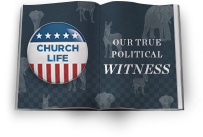A Symposium: How can we work toward greater ethnic unity in our churches?
Editor’s note: We asked four men the following question: How can we work toward greater ethnic unity in our churches? We’ve recorded their answers below.
* * * * *
By Phillip Holmes
Christians yearn for ethnic unity in our churches. But biblical unity is hindered by sin. Sin manifests itself in divisions and barriers across ethnic lines, creating a culture of anger, sadness, and confusion. These divisions and their fruits are problematic because they’re antithetical to the gospel. Over years of wrestling with these things myself, I’ve gained clarity that I think will help us experience the progress we desire.
1. Teach a robust theology of love.
Love is our foundation for unity and what binds believers together in perfect harmony (Col. 3:14). Jesus’ love for us forms the common bond between us, moving us to love one another (Col. 2:2). Ethnic division is rooted in a failure to understand biblical love, recognize its implications, and live them out faithfully.
2. Study the history of racism.
One of the greatest threats to unity across ethnic lines is fake history. Christians who are serious about pursuing harmony must diligently study history from credible sources. Love calls us to rejoice in the whole truth, not just narratives that protect our interest (1 Corinthians 13:6).
3. Build genuine relationships.
Relationships across ethnic lines are crucial, and we should enter them with a desire to know and be known. We need relationships rooted in a longing to promote one another’s joy, forsaking any action that could cause harm. We must put each other’s wellbeing before our own. The fruits of the Spirit characterize these relationships, while arrogance, resentment, and envy are their adversaries.
Remember, ethnic harmony is a by-product of God’s truth lived out. It’s not the goal. Failure to live in harmony is a failure to proclaim God’s truth to the world. But our unity is evidence of our union with Christ, and it declares the power of the gospel to our divided nation.
Phillip Holmes lives in Jackson, Mississippi, where he works in communications and marketing for Reformed Theological Seminary.
* * * * *
By Peter Y. Lee
How can we work toward greater ethnic unity in our churches? What a great question! As an Asian Christian, it’s one I’ve thought about a great deal. My immediate thought is this: treat us as people, not percentages. Many church leaders want to have their local congregations reflect the ethnic demographic of their respective communities. When this is the goal, it’s easy to value the importance of a visitor/member based upon their ethnicity, not on the fact that they’re a Christian whose been united to Christ by faith or, if they’re a non-Christian, a sinner in need of God’s grace. What unites us is not ethnicity, but our faith in Christ. Regardless of a person’s ethnic heritage, we share a common love for Jesus.
When I’m around fellow academics who wrestle with texts of Scripture, I’m part of a band of brothers. I feel the same sense of unity when I’m with fellow pastors who strive to preach the gospel. However, when the subject shifts to ethnic diversity and the need for multi-ethnic churches, all of a sudden, all eyes turn toward me. The reason why is clear—as an Asian, I offer that diversity. Earlier, I was part of a group that loved to preach Christ and theology, but all of a sudden, I’m being told that I’m a “minority.” Before, I was one with fellow believers. Now I’m being told that I’m different.
What happened? The times I feel most marginalized and isolated in the church are when this subject of multi-ethnicity comes up. I’ve fought to maintain my identity in Christ, so help me do that. Treat me as a person who’s been redeemed by the sacrifice and resurrection of Christ. That’s what I need to hear every day! And guess what? So do you. In Christ alone is our unity.
Peter Y. Lee is an Associate Professor of Old Testament at Reformed Theological Seminary in Washington, D. C.
* * * * *
By Irwyn L. Ince
The biblical and theological grounding of the imperative to work toward greater ethnic unity in our churches is the Imago Dei. God’s triune nature, his unity in diversity as one who exists in mutual loving and glorifying community is instructive for how he designed humanity to image him. Christians are united to one another in love, have communion in one another’s gifts and graces, and are therefore obligated to pursue their mutual edification.[1] This is a love that overcomes division and reconciles contraries, bringing into communion those who have nothing in common except the fact that Christ gave himself for them.[2]
My own research in the area of Identity Formation in Diverse Churches revealed three key ways to shepherd churches toward greater ethnic unity. First, churches must embrace the theology of unity in diversity as a gospel imperative. This belief cannot be seen as a tangential issue if churches are going to pursue ethnic unity. To refuse to pursue unity in diversity as a gospel imperative is to fundamentally neglect what it means for humanity to image God. When Christ came, he proclaimed far more than individual salvation. He proclaimed the coming of his kingdom. Thus, the gospel is so much more than a message of individual salvation. It must include the fullness of what it means to be made in the image of God. The finished image, the most telling and striking likeness of God, is the entirety of redeemed humanity. Holding a position like this will change the character of preaching in a church, as well as the way a church lives in fellowship.
Second, churches need to gain cultural awareness of their church and its members. Because cultural values lie beneath surface of the things we see, hear, and experience, they often go unaddressed. Therefore, churches need to develop an awareness of their unseen cultural values. These values include things like the understanding of time, worship music, community life, and responsibility. In religious organizations, differences in culture are often framed in absolute terms: “We’re just being biblical.” But if churches are to pursue the creation of a new “we,” where the dividing walls of hostility are broken down, they cannot afford to ignore the values that form their expression of “church.” In other words, churches need to be able to better express love cross-culturally.[3] This is not to say there ought to be an “everything is up for grabs” attitude toward church practices. However, there must be a clear grasp of what’s essential and what’s preferential.
Third, churches need to find ways to affirm the full humanity—the royal dignity—of all people, especially those whom others are inclined to despise.[4] To affirm the full humanity of people means to help them be situated rightly in understanding their immense value while simultaneously grasping that they are not God. The impact of racial hierarchy, privilege, and class in society has had a substantial impact on the way people interact with one another and value themselves. It cannot simply be said, “Just believe in Jesus, and those cross-racial social challenges will disappear.” You don’t overcome the dignity dynamic simply by believing in Jesus together.
In order to affirm the full humanity of all, churches should pay particular attention to two related practices: structural inclusion and the proper exercise of power. Structural inclusion is an aspect of hospitality and making room for others. People who aren’t a part of the majority pay the greatest cost to belong in an interracial organization. But their representation within the organization can be increased through structural inclusion. The same cultural values listed above can be avenues for this inclusion: music, diversity in leadership, and accommodating different attitudes and understandings of time.[5] It is important to note that structural inclusion has to be pursued with authenticity, not as a way of creating a statistical diversity within the church.
The proper exercise of power in the church means creating an environment where people are able to flourish.[6] Research shows that in interracial churches, those who wield power affirm white privilege and culture. Non-Whites bear the burden of maintaining a racially mixed worship experience.[7] This isn’t a result of malicious intent; it’s simply an implication of the way cultural values operate beneath the surface. Leadership has the responsibility to exercise authority in a way that facilitates welcome and embrace. One way churches have done this in recent years is by providing forums and conferences for members to address the issues of race and injustice. The goal isn’t just dialogue, but confession and repentance concerning these issues. Their experience of welcome and embrace was enhanced by the church’s willingness to bring up the issue of race in a way that invited dialogue and vulnerability.
These recommendations—embracing the theology of unity in diversity as a gospel imperative, developing an ongoing awareness of the unseen cultural values operating within the church, and affirming the full humanity of members—aren’t easy. I submit, however, that they are necessary if churches are going to work toward gospel health in ethnic unity.
Irwin L. Ince is an assistant pastor at Grace DC, a family of Presbyterian churches in the DC area. He is also the Director of Grace DC’s Institute of Cross-Cultural Mission.
* * * * *
By Paul Jeon
First, wrestle with what the Bible says, both implicitly and explicitly, about the gospel and the coming together of “every tribe, tongue, and nation.” I grew up in an Asian-American church, and my first two stints as a pastor were at Asian-American churches. The more I wrestled with the message and implications of the gospel, I couldn’t see myself raising my family and growing old in a church that was committed to being Asian-American. I’m not saying that every person must arrive at the same conclusion. I just felt “convicted”—I realize that word is tossed around somewhat flippantly—that I would have a hard time explaining to my children that the gospel is for “Jew and Gentile” and yet we were attending an almost exclusively Asian church.
Second, be sober about the messiness of adoption into God’s family. God is bringing together people that aren’t just different but broken. This means there will be many misunderstandings, hurts, and offenses as very different people figure out what it means to be family in Christ Jesus. This is especially true as we cross boundaries of ethnicity and socio-economics. I’ve learned “to be cool” about potentially offensive remarks. In one instance, I spoke at a predominantly Caucasian church. Afterwards, a harmless elderly lady approached me, took my hand, and with all the sincerity she could muster said, “Your English is very good. I was so surprised and impressed.” Born and raised in the States and proficient in English, Greek, Spanish, and Korean (in that order), I didn’t know how to respond other than with a polite smile and a “thank you.” I understand many feel that we can’t be “cool” about everything. All I’m suggesting is accepting the messiness involved with the blessing and work of being a diverse family that’s united in Christ.
Finally, we should form deep friendships with people of different ethnicities. Understanding, accepting, and celebrating our differences can’t happen outside of deep friendships with different people. A little friendship will go a long way in this hard but necessary work of facilitating peace.
Paul Jeon is a visiting lecturer in New Testament at Reformed Theological Seminary’s DC campus.
* * * * *
FOOTNOTES:
[1] Westminster Confession of Faith, chapter 26.
[2] George S. Hendry, The Westminster Confession for Today: A Contemporary Interpretation (Atlanta: John Knox Press, 1960), 219.
[3] Livermore, Cultural Intelligence: Improving Your CQ to Engage Our Multicultural World, 125.
[4] Harrison, God’s Many-Splendored Image: Theological Anthropology for Christian Formation, 106.
[5] Christerson, Edwards, and Emerson, Against All Odds: The Struggle for Racial Integration in Religious Organizations, 154.
[6] Ibid.
[7] Edwards, The Elusive Dream: The Power of Race in Interracial Churches, Location 485.












